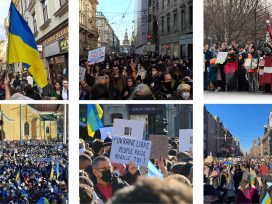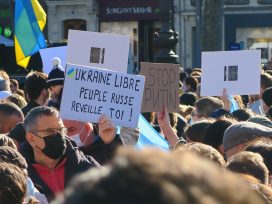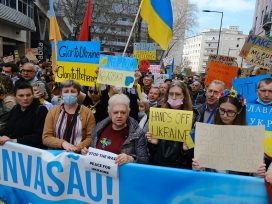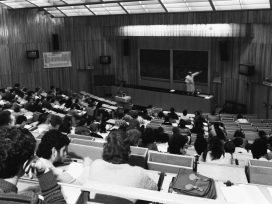Europe’s two hearts
The war in Ukraine has shown up the limits of European pacifism and revived a long-forgotten precept: republican opposition to empire. Today’s imperial threat no longer comes disguised as democracy but is openly anti-democratic. Part of the series ‘Lessons of war: The rebirth of Europe revisited’.
In 2003, two European philosophers, Jürgen Habermas and Jacques Derrida, published a joint piece in Germany’s and France’s leading newspapers. In it, they criticized the American invasion of Iraq and called on Europeans to ‘assume a reflexive distance from themselves’, in particular their imperialism and colonialism. By criticizing American neo-imperialism, Habermas and Derrida instead wanted to imagine a post-imperial Europe and fulfil ‘the Kantian hope for a global domestic policy’.
Habermas’s and Derrida’s criticism of Bush’s imperialism was justified; and their suggestion that Europe could lead the world towards a post-imperial future was a nice idea. Today, however, confronted with Russia’s genocidal invasion of Ukraine, the question is whether such a post-imperial world can be achieved through the means that the two philosophers proposed.
The Europe they imagined was a Europe of dialogue, of conversation and embrace of differences. This is, certainly, a dignified idea. The problem is that it is powerless when one is faced with evil.
Europe’s conception of itself after World War II focused on the self-evidence of peace. It asked how the territory of peace could be enlarged, but not how peace should be defended. It was attracted to the idea of removing borders for the circulation of the good (as a moral concept, not only goods as an economic concept), but not how to strengthen borders against evil. It relativized the question of evil, thinking that all evil can be reintegrated, simply by the attractiveness of the good. This formed Europe’s (primarily Germany’s and France’s) long-lasting affair with Russia. In this relationship, Europe took Goethe’s Faust literally by testing the idea that one can make a deal with the devil. But it forgot how the story ends.
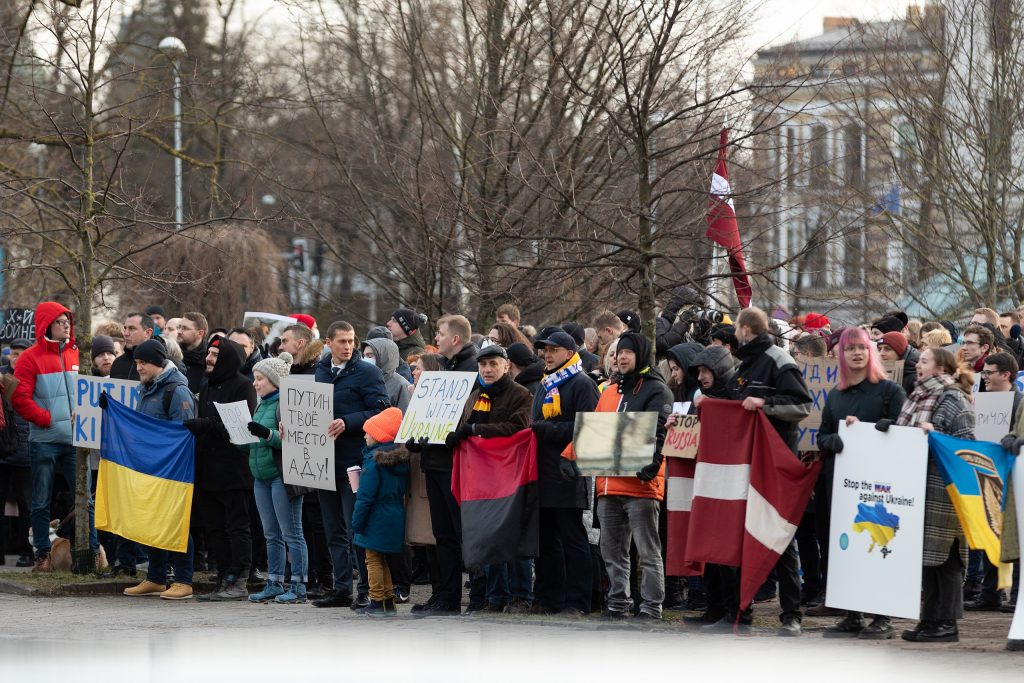
Riga 24.02.2022 / Saeima, CC BY-SA 2.0, via Wikimedia Commons
The post-war philosophers formulated well how imperial (and to some extent post-imperial) nations could overcome their own imperial instincts. But they remained blind to what non-imperial societies need to do when faced with neo-imperial aggression.
Yet the origins of the European idea contain a response to precisely that question.
Richard von Coudenhove-Kalergi – author of the prophetic book Pan-Europa, published in 1923 – has been praised as a visionary ‘precursor’ to post-war Europe, but his major arguments are largely forgotten. These touched upon the big question: how can republics defend themselves against obsessive empires (at that time Germany and Russia), especially when these republics are smaller and weaker?
Coudenhove-Kalergi’s answer was clear: only by creating a confederation of republics, a security union – not only an economic or political union – that would be much more difficult to attack than atomized nation states. It would be a union that sought a balance between the benefits of peace and the need to defend it. A balance between agora and agon.
Agora and agon: Europe’s two hearts
There are two ethical systems on which Europe has been built: two ways of determining attitudes towards the other.
One is the ethics of the agora. It presumes an ethics of exchange. In the agora, we give away something to get more than we had. We exchange goods, objects, ideas, stories and experiences. The agora is a positive-sum game: everyone wins, even though some try to win more than others.
The other ethical system is that of agon. Agon is a battlefield. We enter agon not to exchange, but to fight. We dream of winning but are also prepared to lose – including to lose ourselves, even in the literal sense of dying for a great cause. This is not the logic of a positive-sum game; there can be no ‘win-win’, because one of the sides will certainly lose.
Europe has built itself as a combination of agora and agon. It bears the image of both the knight and the bourgeois. Europe’s cultural legacy is unthinkable without the ethics of agon: whether it is medieval novels with their cult of chivalry and loyalty, or early modern dramas whose characters stand and die for their principles and passions. But Europe is also unthinkable without the culture of the agora, of conversation, compromise, of softness, of Voltairean mœurs doux.
The European cultural canon also contains criticism of both agora and agon – when these go too far. It includes attacks on the knightly culture and of the cult of war (from Cervantes to Remarque), as well as on the bourgeois culture of ‘exchange’ (from Molière to Balzac).
Both these ethical systems contain profound human values. But, taken to their extremes, they are dangerous and need to be balanced by the other.
The ethics of the agon teach us to see all humans as potential adversaries, and to consider all interaction as a latent fight. This can lead to war of all against all. What Hobbes describes in Leviathan as a ‘state of nature’ is actually a highly sophisticated stage of social development that absolutized warrior ethics and considered any other as a threat.
Radical agora ethics, on the contrary, absolutize exchange and compromise. Here, exchange and dialogue are the ultimate answer to all questions. War and conflict are considered consequences of human insanity and the only reason people fight is that they did not have the chance to talk enough to each other. If the agora logic is applied universally and infinitely, we would lose a sense of where to stop in our passion for exchange. We cannot and should not talk to a killer at the moment he is about to kill us; and we cannot and should not ‘exchange’ the lives of our loved ones or fellow citizens for something else.
Truth and justice thus emerge as a balance between our readiness to exchange and our understanding that some things are unexchangeable and irreplaceable. For example, human lives.
Why Habermas and Derrida were right – and wrong
Despite their philosophical disagreements, Habermas and Derrida shared something important. This was the idea that agora should replace agon and consign it to oblivion.
Habermas places his faith in an infinite space of communication in which everyone should be ready to adapt their positions when faced with new rational arguments. Derrida built his philosophy on the idea that western metaphysics is a dictatorship of presence, of the irreplaceable voice of a metaphysical father, and that the only way to counteract it is with the idea of infinite replacements and reinterpretations. This is done by what he called écriture.
While Habermas tries to ensure the expansion of reason, Derrida was interested in the persistence of what escapes reason’s control. Yet both believed that an eternal process of exchange and replacement is the answer to the religious and metaphysical dogmatism of earlier epochs. They both tried to undermine the irreplaceable.
The problem they failed to see is that agora is impossible without agon. You cannot have infinite dialogue inside a city-state unless you build a fortress protecting your city against would-be destroyers. The Europe of Habermas and Derrida was built on the naive belief that all enemies were gone and security was nothing to worry about. They preferred to ignore the possibility that our enemies will only leave after they have killed our kids.
The hypocrisy inherent in the conception of Europe as a continent of ‘eternal peace’ and ‘infinite agora’ is that it has only been made possible under the security umbrella of NATO. Habermas and Derrida were right to denounce the inhumane avatars of American imperialism, but they were wrong to reject America as Europe’s key partner and alter ego. While Europe was building welfare states, America was building a security framework, providing the conditions under which Europe could continue to be a social paradise. America was not from Mars, and Europe from Venus, as Robert Kagan believed; America just filled the gap of agon (i.e. the walls of defence) that Europe had left, believing too much in the self-evidence of peace and the self-reproduction of agoras.
Why 2023 is different from 2003
If our goal is to build a more just post-imperialist world, it is important to point to the parallels between the US invasion of Iraq in 2003 and Russia’s invasion of Georgia in 2008, Ukraine in 2014, Syria in 2015, and Ukraine again in 2022. Yet there is a crucial difference.
The war in 2003 was the result of a democracy cheating itself, hiding its imperialism behind an alluring democratic rhetoric. It was partially caused by the fact that the ‘western’ world still felt strong, so strong that it thought it could risk doing whatever it wanted – a direct path to tyranny. 2003 was the result of an anachronistic self-confidence – borne of the idea of ‘the end of history’ – not knowing how to react to the shock of 2001.
Twenty years on, we are living in a different reality. Democracy is no longer turning into empire; it is being attacked by empire. This empire and its authoritarian allies see that democracies are weak and unprotected. That they have lost the spirit of agon. That they mock the knightly culture of the past. And that they can therefore be attacked and eventually destroyed.
The ongoing Russian war on Ukraine is an attack on Europe. Russia is at war with Europe. It is time to accept this fact fully and draw all the necessary conclusions. The agora is not enough. There are times when you need to defend it. When you need to revive the agon, as an element of your identity.
It’s not because you want war. It’s because sometimes war comes to you. In order to defend your peace, you must become a warrior – or at least align with the warrior as much as you can.
Sometimes it is not enough to avoid evil. Sometimes you need to confront it, face to face.
Published 15 August 2023
Original in English
First published by Eurozine
© Volodymyr Yermolenko / Eurozine
PDF/PRINTIn collaboration with
In focal points
Newsletter
Subscribe to know what’s worth thinking about.
Related Articles
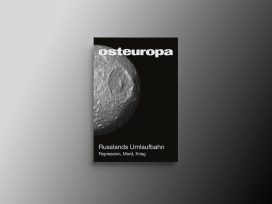
Russia’s orbit
Osteuropa 4/2024
Repression, murder, war: on the logic driving the Putin regime toward ever-greater excesses of violence. Featuring Yuri Andrukhovych on the Russian colonial empire – the only ever to have tried to reconquer a former possession. Also: articles on Navalny, and on what next for Georgia?

The difference between knowing from distance that war is being waged and living that reality couldn’t be more extreme. But can awareness of multiple repercussions turn protective disassociation from violence into active solidarity? ‘The Most Documented War’ symposium in Lviv, Ukraine, provides valuable pointers regarding engagement and responsibility.
